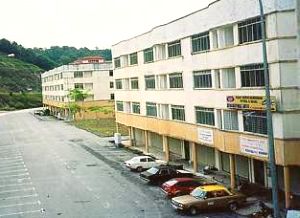Property Talk: A weekly column by S.C. Cheah
PROPERTY management has become a hot issue these days.
The problems of people living or working in strata-titled properties like
apartments, condominiums, shop offices and shopping centres where the retail
lots are sold on a strata title basis are well known.
Fortunate are those property owners and tenants where the properties are
well-managed but as the National House Buyers Association (HBA) said
recently, about 70% of the condominiums and apartments in the country are
badly managed. This may just be the tip of a growing “iceberg”.
The Land and Mines Department director (strata titles section) Dr
Azimuddin Bahari has also remarked that Malaysians lack the right mentality
to live in high-rise buildings.
Indeed, with more such properties being built, there is an urgent need
for a review of existing legislation pertaining to the management of these
properties and how best to enforce it. There have also been numerous calls
in the past for legislations compelling property owners to pay their
maintenance charges and how property management should be run.
This pressing issue, if not resolved, will become a ticking “time bomb”
as more buildings deteriorate because of poor management and in many cases,
it is also a result of lack of funds.
On one hand, you have property owners who will not contribute their share
towards the maintenance of their property and on the other, you have
property managers who mismanage or fail to provide good service despite
having collected enough maintenance fees to run the property.
 |
|
Owners of vacant shop offices such as these in Jalan Seroja 1A in
Bukit Sentosa, Rawang, are stilled billed maintenance charges.
|
It is unfair for those who have diligently paid their dues. The sad thing
is that, eventually, everyone refuses to pay when the building cannot be
maintained properly because of poor collection of maintenance fees.
The question is why is it that places like Hong Kong and Singapore can
have such a robust property management industry? The answer, of course, lies
in the existence of stringent laws related to property management.
There is also the other “extreme” case of whole blocks of buildings and
commercial centres that have been vacant for years and yet you have
developers and municipal councils billing the owners for maintenance fees
and assessment rates respectively when no services have been rendered. This
is also a big issue as there are tens of thousands of vacant units.
Is it morally right to charge owners when no kind of services has been
given? Should not the authorities compel the developer to do something,
especially with regards to security, so that buildings do not continue to be
vandalised?
Anyway, developers generally are of the view that they have better things
to do than managing a property that is a “thankless job”.
As Glomac Group executive vice-chairman Datuk Richard Fong said, managing
a property is a business that nobody wants to do, as there are too many
problems involved.
He is proud of the fact that the group's properties are all well-managed
but worried that its low-cost units might pose a problem later on if the
owners do not pay their maintenance charges, as is happening with many
low-cost dwellers.
“We may have to dig into our pockets to pay the maintenance fees,” he
said, adding that responsible developers like Glomac would want to ensure
that their properties were well managed as their reputation was at stake.
Fong said it was not easy to be a property manager, adding that he had
seen some high-end condominiums where 5% to 10% of the owners refused to pay
their dues for various reasons and would only pay if their property were
managed to their satisfaction.
Meanwhile, another bristling issue over who should manage a property has
been hotly debated. It is over the proposed amendment to the Valuers,
Appraisers and Estate Agents Act 1981.
Apparently, there have been some confusion over the move by the Board of
Valuers, Appraisers and Estate Agents (BVAEA) to open a third register just
for property managers. The existing two registers are for valuers and estate
agents.
There were uproars, especially among developers, that the BVAEA was
trying to reap a large lucrative business in property management by having
registered valuers as property managers.
Critics claim that this might mean a layer of unnecessary expenses when
in-house property managers are doing a fine job. Companies that have their
own property management firms that charge a fee for managing the properties
of their subsidiaries might now have to engage registered valuers instead.
Well, I have sought clarification from BVAEA's board member Elvin
Fernandez and he has said that this is all not true. The fact is if the
property is yours, you can run it as you like. If you have a property
management company that also charges a fee on your own subsidiaries, all you
need to do is you must register the company with the Board within a year of
the passing of the amendment